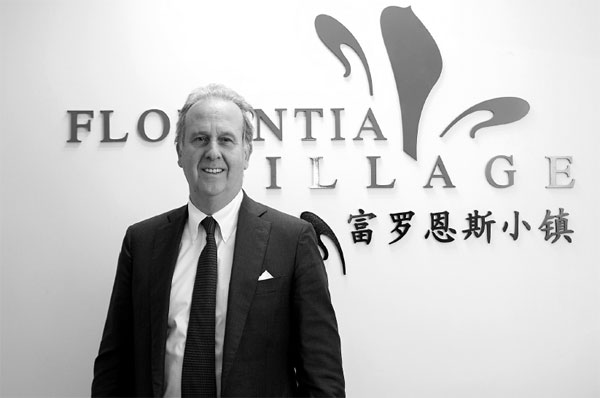 |
|
Maurizio Lupi, managing director of Florentia Village and RDM Asia, plans to have seven outlets up and running in China by 2017. GAO ER QIANG/CHINA DAILY |
Florentia gets big brands under one umbrella to draw Chinese shoppers
Two designer outlet villages are set to open in Pudong next year ahead of the first phase of Shanghai Disneyland-Silk Road Holdings' Renaissance-styled Florentia Village, in January, and Shanghai Village, operated by Value Retail, later in the fall. They could hardly have timed it better: The domestic luxury clothing market is fast maturing in China's financial capital amid a period of economic cooling on the domestic front exacerbated by an ongoing anti-graft campaign. Disney-generated tourism should sprinkle additional fairy dust on their respective operations.
Since the world's first outlet mall opened in the United States in the late 1970s, brands have generally considered them a last resort, the final channel of distribution.
Even 20 years on, when outlets started popping up globally, their shelves were littered with damaged or ill-fitting cast-offs.
They have since moved upmarket. Now more brands incorporate them into their sales targets, especially in China.
Florentia Village-named after the archaic spelling of the Tuscan capital-opened its first China outlet in Wuqing, a district of Tianjin, in 2011, less than a decade after outlets first touched down on the mainland.
The group, which comes armed with a strong European pedigree, decided to invest in China in 2009 after three years of market research.
This resulted in Silk Road Holdings, a joint venture of four partners: Gaw Capital Partners a Hong Kong-based private equity real estate company; Waitex, an American-Chinese group; the Italian holding company Fingen SPA, part of RDM; and TIAA Henderson Real Estate.
They struck gold immediately. The reconstructed 16th century Italianate buildings, gondoliers ferrying guests along mock Venetian canals and bounty of discounted brands proved a huge commercial success.
"What we have is much better than at the Venetian in Macao or Las Vegas," said Maurizio Lupi, managing director of Florentia Village and RDM Asia. "We get plenty of requests to hold weddings there."
Traffic is expected to reach 4.1 million people this year, with 120,000 ranking as VIP members who visit monthly. Turnover is projected to hit 2.2 billion yuan ($356 million) by Christmas, up 25 percent from 2013. The year earlier, it grew a whopping 40 percent.
But such explosive growth is not strange in the first year.
Scores of luxury brands-Armani, Burberry, Ferragamo, Versace-jumped on board; some, like Prada, have exclusive agreements with the group in China; a minority-Hermes, Louis Vuitton, Chanel, luxury watchmakers-do not deal with any outlets for fear of diluting their value.
"Most of them see it as a way to grow their brand, not weaken it," said Lupi. "For people with lower purchasing power, it's a way to connect to the brand, and later they migrate over to the high street store."
The center, built in front of the only bullet train stop from Tianjin to Beijing, now ranks among the top four outlet villages in the world, he said.
"We have an amazing mix of over (193) client brands, more than anywhere in Europe," said Lupi, who made monthly trips to China for seven years before relocating to Shanghai last year. His son studies at Fudan University.
"About 25-26 percent of our customers come by train," he said. "We do promotions so they can get their ticket redeemed if they spend more than a certain amount. This works very well during the winter."
A third phase of construction this autumn extended its gross leasable area to around 50,000 sq m.
A Retailer Academy keeps the store managers on top of their game, while a special team checks the displays, cleanness, assortment and prices of all the shops "at least every two days", he said.
According to one external review of the center in 2012, five tenants-Prada, Zegna, Ferragamo, Burberry and Coach-were generating one-third of total sales, although Silk Road says 15 percent is more accurate.
At the time, they covered about 3,000 sq m of retail space, or 7 percent of the GLA.
Nonetheless, the report concluded that "the designer brand and retail mix at Tianjin Florentia Village is robust, well planned and positioned."
